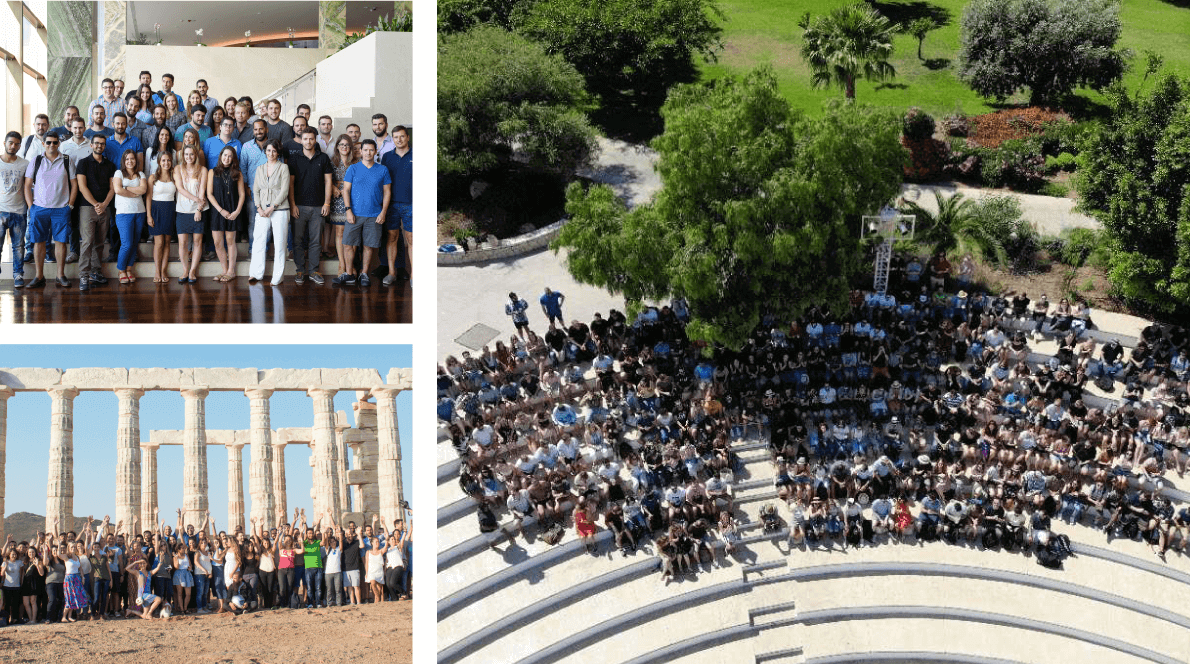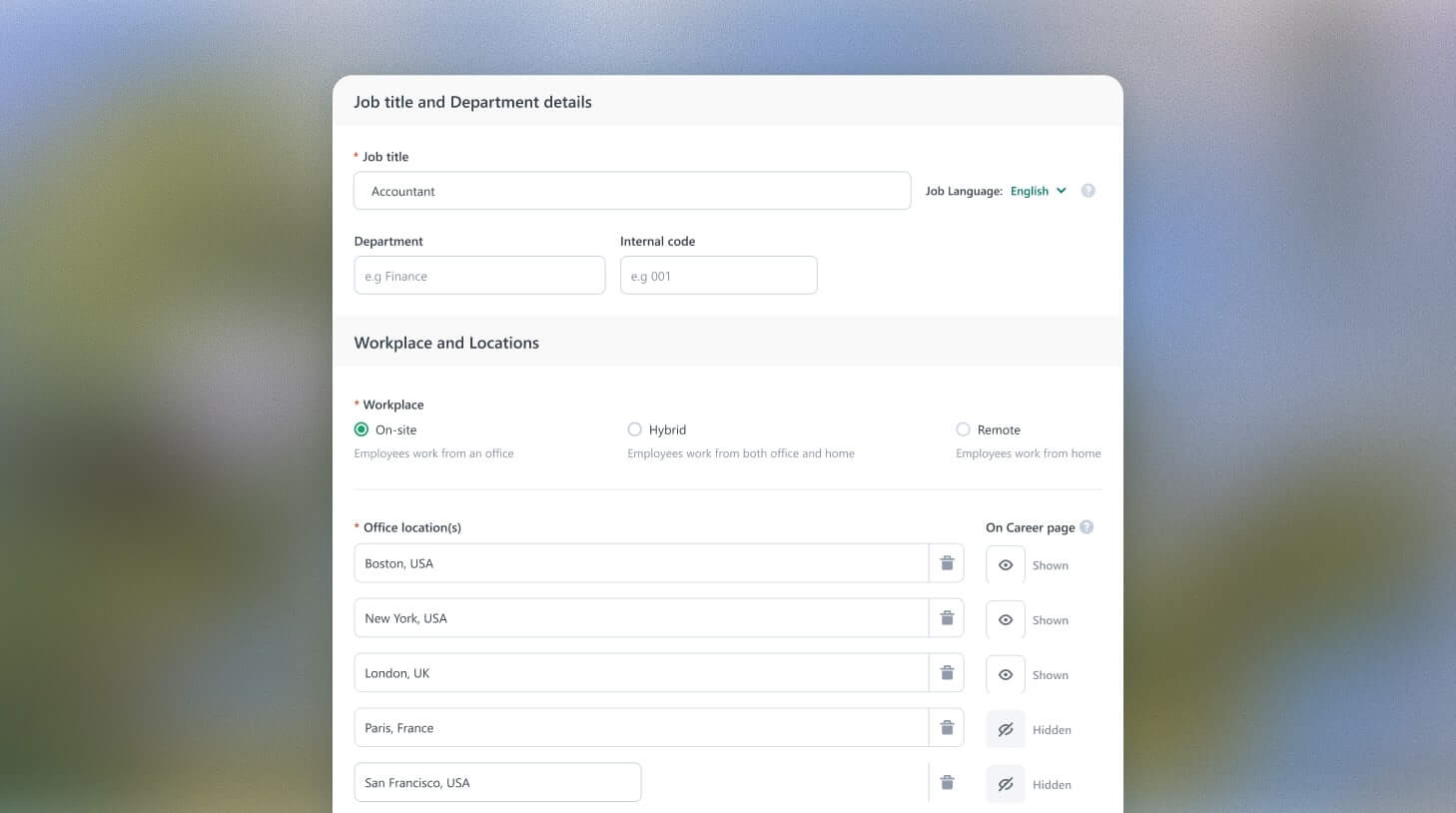Evolution of a company retreat: from product updates to breaking bread

Some people call it a corporate retreat. Others call it a company gathering. Still others call it an all-hands. Workable CEO Nikos Moraitakis calls his company’s own tradition of the company retreat simply as “the summit”.
It was an idea that took form over time, he explains, and grew into something more. Something with energy and purpose of its own.
“I think the idea is mostly popularized with companies with a lot of remote employees who needed to meet with each other once or twice a year,” Nikos explains, noting that in the beginning, it was simply a product summit with all hands on deck every three to six months. That, of course, was an easy thing to plan for.
“The first time we did it [in 2013],” he says, “the company must have had between five and 10 people.” The only person who wasn’t in Athens at the time was Workable’s Vice President of Partnerships, Rob Long, in London. That meant just one long-ish trip had to be planned; the rest could just gather at the Athens office and dive headways into the planned agenda.
“For one day, we all had this one meeting where we spend the whole day together,” Nikos explains, noting that there’s no separation between departments in a startup with less than 10 colleagues.
The focus of that gathering was clear: to review how many customers they got and how they’re using the product, to try and figure out what’s happening with the product, and what they were going to do in the months ahead based on the takeaways from that review. A regular planning session, so to speak.
That escalated quickly
“Six months later,” Nikos recalls about the 2014 event, “there were 15 of us. Then, [in 2015], it was something like 40-50 of us – not all in Greece. Some were in London and one in Portland, Oregon.” That summit saw 57 colleagues gathering at Astir Palace in Athens – take note if you’re looking for company retreat locations.
The temptation from a business standpoint would be to look at those numbers and make a decision on who should attend because of costs involved. But Nikos and his colleagues decided that everyone should be involved in such a company retreat – even as the number of people to be flown in and put in hotels was growing. Remote employees were put in a hotel and local Greek colleagues would drive in for the day, and they’d have a full-day gathering in a rented conference room at that hotel.
But then, things happened that evening during the dinner – the conversation went far beyond that of product and planning.
“We ended up discussing a lot more things. And since we got everyone together, we said, ‘OK, so let’s talk about the financing and everything we do.’”
That inspiration evolved into the next company retreat: a full day of intense discussion on features, pricing, presentations, and so on, Nikos adds. Many decisions were made this time – lending further value to the event.
They were at it again the following year, in 2016, at Grecotel Cape Sounio a little over an hour south of Athens – with 103 people in tow. Colleagues started remarking on how they enjoyed meeting so-and-so during the dinner that night, and particularly getting to know each other in a social setting outside of the work environment.
Persistence has its prize
As the summit and its purpose grew and evolved, Nikos recognized other benefits to organizing a regular company retreat.
“We said, ‘Now’s the worst time to stop it. Now that we have this many people who are abroad and they haven’t spent too much time with the others in Athens, now, it’s the best time to bring them together one day.’”
“We started realizing how big of a deal it is for the people in the company. This isn’t about the product meeting. The best part of it is everybody coming together.”
In 2017, Workable then had 170 people whisked away to Grecotel Olympia Riviera, a three-hour drive west of Athens, for a four-day event. This was a treat for local Greek colleagues who previously were driving to the destination and returning home in the evenings.
This time, “we had fewer presentations and more socializing activities,” Nikos says, going into detail about a team-building exercise where they split the company into 10 teams and each team was given materials to build a raft, which they’d take to the ocean for a test run and a race.
“As a team-building activity, it was fun. It was really hard to make the raft, let alone sit on it and paddle with it and battle out the people who were trying to destroy your raft.”
Again, as before, there was something new to be learned. The ‘organized fun’ had its drawbacks. Workable colleagues approached Nikos to tell him that they actually enjoyed having a drink by the pool with the little extra time they had, more so than the activities themselves.
Makes a lot of sense. Studies have actually found that there’s a significant health benefit to having some free time throughout the day on a regular basis, particularly when a strong message is sent out that people are permitted and encouraged to have that free time (which calls in the importance of clear company messaging).
In response to that, the 2019 summit saw a priority placed on free time rather than company functions. More than 250 attendees flew and bussed to Barcelo Hydra Beach Resort, some four hours south of Athens. As far as company retreat locations go, this was an attractive spot: a beachfront location with bungalows, open-air nightclub setting, large cafeteria, a swimming pool, plenty of beaches – ideal for a social setting. As Nikos put it:
“You come back and you have people who are not just colleagues, but many become friends.”
The quid pro quo effect
Friends isn’t just about getting together and enjoying each other’s company. When colleagues are more familiar with each other beyond their usual working relationship, there’s a tangible benefit to the business.
Nikos explains: “The biggest problem in companies, especially with remote workers and international offices, is that, inevitably, there will come a day when you need to go to someone not on your team, and you would have to ask them to do something they don’t want to do.”
It could be because you made a mistake in your job, and you need someone to help you fix it quickly. Or it’s your important customer, the one you really want to keep, and somebody needs to do something extra for them. That’s challenging when you don’t really know them.
“If that person [you need to talk to] was just a name on an email list,” Nikos says, “and you only knew the boss of their boss and you’ve never spoken directly with that person, and you’re going to just speak on a phone call, it’d be harder to get what you need done.”
However, if you had met that person over a beer or gone swimming with them on the beach, and had become friends, and they know you’re a nice guy, Nikos says, “of course they’re going to help you.”
Getting out of their cars
He refers tangentially to a well-studied phenomenon, that of road rage.
“Think about it,” he says. “If we’re walking down the street and you walk right into me, I’m not going to say, ‘You bastard, why’d you do that?’ That’s because we were not programmed to say or act something like that to someone’s face.”
But, Nikos notes, “when you’re inside a car, and the other person is inside another car, what happens is that when you’re shouting at someone, you’re not shouting at the person – you’re shouting at the car. People inside their cars say things to people in other cars that they wouldn’t have said if they were standing next to each other.”
He adds that a similar phenomenon takes place – to a lesser degree, of course – when you have remote teams working together from different locations, communicating via email and other digital media.
“What happens in companies like ours where people sit in offices very far away is a mild version of that. We are looking at the person sitting in a computer screen. It’s not quite the same. And you don’t need to be next to each other every day.”
He then notes another aspect of human psychology: sharing food with other people, which he says is the most powerful bonding activity humans have. It’s especially so when they are together sharing a meal – it’s been scientifically proven to have an effect on consensus and cooperation in the workplace.
“It gets people out of the car, has them break bread together, and this brings them closer together.”
It’s not just friends
There are other benefits to holding a company retreat. Nikos reminds us that investors have attended the summit and shared their powerful insights: “Obviously, these people have put so much money into it and they think that this company is going to be worth billions. They have a reason why. So it was good for them to explain in macroeconomics to the employees why this company is going to be so great.”
There’s also a managerial aspect to it.
“I have a rule,” Nikos says, “where all the executives need to talk every quarter and meet the team on the other side. [Senior Vice President of Sales & Marketing Rachel Bates] has 120 people in her team – so she meets once every quarter. Other people may meet once a year. Now, these people can have that once-a-year meeting, plus the summit.”
With that, Nikos refers to the summit as a management tool that can be built and updated, and grows with its scale.
Company retreat long-term goals
Nikos emphasized the power of bringing everyone together to the same table for a few days. At the summit, he says a lot of people think: “Today, I’m going to stop worrying about what happens next week. I’m going to think about what happens a year from now. And I’m going to do that together with other people who I’m hoping will be with me a year from now.
“And we’re going to eat together and have fun together and meet each as a person. If you weren’t working with them for a year and I just took you to a hotel, you wouldn’t become friends,” Nikos continues.
But, he adds:
“If you have worked long enough to know each other long enough, and then I take you to that place and I give you the time to sit down and discuss on top of everything you know from each other, you realize you’ve already been friends with those people.”
And it doesn’t matter how often it happens – it matters what the quality of the summit is, what the company retreat ideas are, and how it’s organized. And of course, its overarching purpose. Are you looking to build a plan for the next year for your product? Are you pulling investors and clients together for a high-quality, educational round table? Are you going to have training sessions for all your colleagues? Or is it all of the above, with plenty of time set aside for open socializing and connecting?
Nikos answers from his own experience: “In the beginning, the most important thing is that everybody knew what was going on. Then it became everybody having some fun and we had the American office and the Greek office making sure that these offices liked each other.
“Now you have a bigger company of people like you, with remote teams and so on. And then you get out of the car, shake hands, eat together. You can be real people, together.”
Related: The power of the corporate retreat: 5 reasons why you should do it




